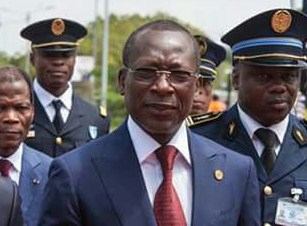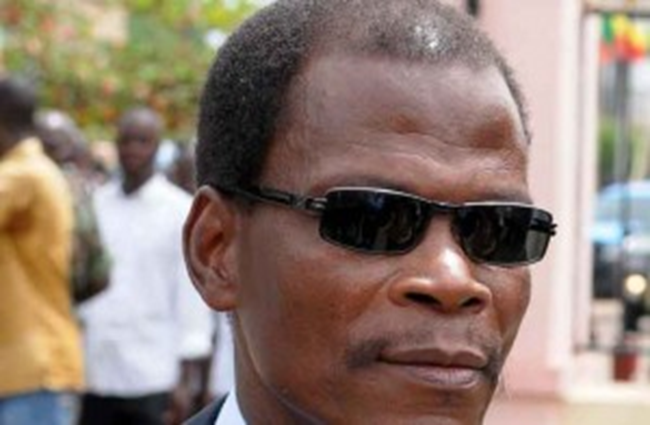Tension reaches the boiling point in Benin–Talon shaken

BY SOUMANOU SALIFOU
The resignation, Monday, of Benin’s Minister Delegate for Defense, Candide Azannai, “to protest the latest political developments in our country,” added fuel to the growing social tension born out of the hiked level of poverty since President Patrice Talon came to power last April, and the president’s plan to revise the constitution, which many of the country’s legal scholars view as a kick on the nose for the country’s vibrant democracy.
Typically, it started as a mid-afternoon rumor on the social media, then quickly swelled into a bombshell when the social media confirmed Azannai’s resignation by publishing his own statement on his Facebook page:
“In the face of the latest political developments in our country, I have decided to turn in my resignation from the Government. The resignation letter in which I request that Mr. Talon, President of the Republic, chief of the Executive, to accept my resignation was delivered to him in his private cabinet this morning at 08:24. Thank you.”
AZANNAI’S HISTORY OF PROTESTS
A cabinet minister’s resignation is rarely a big deal. But Azannai is no ordinary minister. The 58-year-old politician is the president of his own party, Restore Hope, and has served several consecutive terms as a legislator, and held so far cabinet positions under two presidents. Clearly one of the most visible members of Benin’s political elite since the West African nation took the lead in Africa’s embrace of multi-party democracy in 1990, Azannai is also a very vocal and controversial man.

A legislator under the banner of the Renaissance du Benin—the party of Benin’s first president when the country turned democratic after 17 years of so-called Marxist rule—Azannai left the party with fanfare causing a stir. Later, after serving barely one year as cabinet minister under President Yayi Boni, he slammed the door to protest Yayi’s plan to change the constitution to remain in power beyond his two legal terms. Azannai became a real thorn in Yayi’s side with his harsh, relentless criticism of the president. He narrowly escaped an arbitrary arrest by the president in May 2015, later telling the press he had a carefully-laid plan to cause huge damage to Yayi’s political apparatus if he had been arrested.
Azannai later became an early, adamant supporter of the very billionaire businessman who literally made Yayi by heavily financing his two presidential bids: Patrice Talon, Benin’s current president.

The close ties between Azannai and Talon probably explain why the minister’s resignation from Talon’s government has not—at least so far—been messy, unlike his previous break-ups, and the flamboyant now-former-minister has been atypically quiet.
Although Azannai has so far given few details in public about the motives of his resignation, it’s been quite easy for The African—not unlike the local media—to connect the dots by talking to relevant political actors close to the former minister and others.
THE BOMBSHELL
The key reasons, as outlined in the minute—published by the media—of Azannai’s meeting with representatives of his party’s members of the Zou (south) region on March 31 are: the former minister’s exasperation over President Talon’s “poor treatment of his cabinet ministers as less than kindergarten kids;” his acting as the actual head of every cabinet department; the use of his [Talon’s] long-time friend Olivier Boko to buy things for all the government departments; Talon’s trusting the economy to the private sector via companies such as SODECO and ATRAL in which the president and his friends are stake-holders; and the re-instating of a taxing system known as PVI at the Cotonou Port which was initiated by Talon during the tenure of his one-time friend, President Yayi Boni—a system firmly rejected by the former president who stated on national television (ORTB) that Talon stood to make whopping CFA 400 billion a year from the new system. (It’s been widely reported this is the cause of the rift between the one-time friends).

Azannai also disapproved of the heavy-handed crackdown on students’ unions at the public university, and other restrictions to liberty under the Talon government.
The “latest political development” in Benin, to quote from Azannai’s stated reason for resigning, is President Talon’s plan to change the constitution, a plan he submitted to the parliament on March 24, asking that the legislative body deal with it on exceptional, emergency basis—which didn’t happen.
Azannai hates the initiative and calls it “anti-democratic.” In his party members’ words quoted from the previously-mentioned minute, he denounces plans to “outlaw demonstrations and institutions likely to threaten the private economy in favor of the public one; the creation of a spying institution to listen to every telephone call in violation of citizens’ secrets and privacy in order to short-circuit anyone that holds views contrary to those of the government.” The former minister also denounces “the weakening of the judiciary branch with the election of government representatives in its midst; the confiscation of the legislative branch’s prerogatives” by giving the head of state the power to ratify international loans; “the loss of political weight resulting from having only a few parties at the service of the government, on the theory to organize the party system.”
Azannai is outraged by the fact that “the president made all these decisions without consulting anybody. It is autocracy, not democracy.” The minister therefore slammed the door saying: “I don’t want to be a part of these repugnant acts.” So he calls on “all the living forces of the nation to rise up to stop the adoption of an anti-democratic, monarchical and autocratic constitution.”
A WIDELY-WELCOMED RESIGNATION
The National Union of the Magistrates, which adamantly opposes the planned changes to the constitution, says the changes would give the head of state too much power and shield the executive branch against legal actions. The union went on a warning, three-day strike to protest the revision plan, after a march on the parliament Tuesday.
Despite the parliament’s objection to reviewing the proposed changes to the constitution—43 out of the 160 articles total in the document—on an emergency basis, the members of the Law and Human Rights Commission quasi unanimously declared the plan “receivable” on Tuesday, with only one member dissenting: Azannai’s substitute, Guy Mitokpe, who sits in parliament in lieu of Azannai upon the latter being appointed to Talon’s cabinet. The commission’s members include the oldest and arguably most-respected lawmaker in the nation, Rosine Vieyra Soglo, 82, the wife of former President Nicephore Soglo and a powerful legislator since the second legislature in 1996. Rosine Soglo is exceptionally critical of the plan, saying in a published statement:

“This project appears to be a liberty-killer, personalized, tailor-made, and therefore risky. Additionally, it lacks modesty and pretends to heal a country that is not sick from its constitution, rather a model envied for its stability, change of governments, its people’s maturity and the vitality of its institutions despite a few dysfunctions.”
Her husband, former President Nicephore Soglo, (hitherto an unqualified supporter of Talon) couldn’t agree more. Following his meeting, on April 3rd, with a delegation of the National Front of Patriotic Awakening (one of the groups opposed to the revision of the constitution) at the conclusion of their protest march, the president said:
“If Talon is the plan B of FrancAfrique [France’s continued attempt to dominate and exploit its former colonies] we’ll step in and stop him. The constitutional revision project must be put away so we can tackle more serious matters having to do with our farmers and artisans. Our people are rebels. We have to remind Talon of that so he will stop provoking the people.”
But the plan has its supporters as well, besides the members of Talon’s administration. However, they seem fewer in numbers, and are definitely less vocal. They include members of the Parti du Renouveau Democratique, PRD, of the speaker of the parliament, Adrien Houngbedji. Not unlike members of other political organizations, PRD’s emissaries are currently meeting with their constituencies to discuss the constitutional changes, in the event of a referendum to adopt or reject the changes.
REPORTERS RAISE A RED FLAG
But a number of a reporters wasted no time in raising a red flag about what, to them, is the likelihood of the PRD lawmakers being literally bought by Talon. Jules Maoussi, head of the political desk of one of the leading local newspapers, Le Matinal, and the initiator and administrator of a popular reporters’ forum on WhatsApp, writes:
“Let’s be vigilant and stop the Talon-Houngbedji plot against Benin. Houngbedji is Talon’s Chief Financial Officer in the parliament.”
Maoussi also writes:
“Cunning Talon is offering Houngbedji five cabinet positions, four diplomatic positions, and one seat at the Constitutional Court. That’s what has made Houngbedji crazy.”
The reporter concludes:
“The Benin citizens must fire all these lawmakers who are now on the field to poison them about the constitutional revision. […] But Talon will trick them all.”
Another leading reporter, Romuald Boko, founder and publisher of one of the premier local newspapers, Le Pays Emergent, and a magazine titled L’Autre Afrique, scrutinizes the Azannai-Talon relationship in a column titled “Talon-Azannai, a matter of arms purchase.” Boko writes:
“Why not leave an autocrat who wants to do everything by himself? A president who hops into an airplane and goes to France to buy weapons and shoes for the army, despite having a defense minister that he, thereby, keeps uninformed out of contempt and mistrust?”
In reference to what he terms “the business dealings at the state’s highest level, and the embezzlement of public funds,” Boko writes: “In such a circumstance, one either chooses to be cynically silent, or one resigns.”
POPULAR DISCONTENT FLAIR-UP
Azannai’s resignation has triggered a flair-up of the months-old wide-spread comments about Talon’s perceived—not necessarily proven—intention to solely pursue his business interests and crush individual liberties, instead of working towards ending the citizens’ suffering and strengthening Benin’s democracy. This sentiment, which is echoed by some workers’ unions that demonstrated to suppor Azannai’s resignation, makes a segment of the population regret former President Yayi Boni who was widely disliked during his second term.
Azannai may not have said much so far, but Boko warns it’s just the calm before the storm. Boko writes:
“Azannai has been able to find the strength and the courage to keep quiet, and then to hang his apron. Now he is free, and he’ll be able to speak. But not right now. Big revelations are coming.”
For their part, the residents of Glodjigbe, a village a dozen miles from Cotonou, didn’t wait long after Azannai’s resignation on Monday to express their discontent with President Talon. Early Tuesday morning, they took to the streets and blocked traffic on the Benin-Niger interstate highway. Chanting slogans hostile to President Talon, the angry crowd demanded that the government settle a dispute opposing them to the state regarding the government’s plan to build a new airport in the area.


